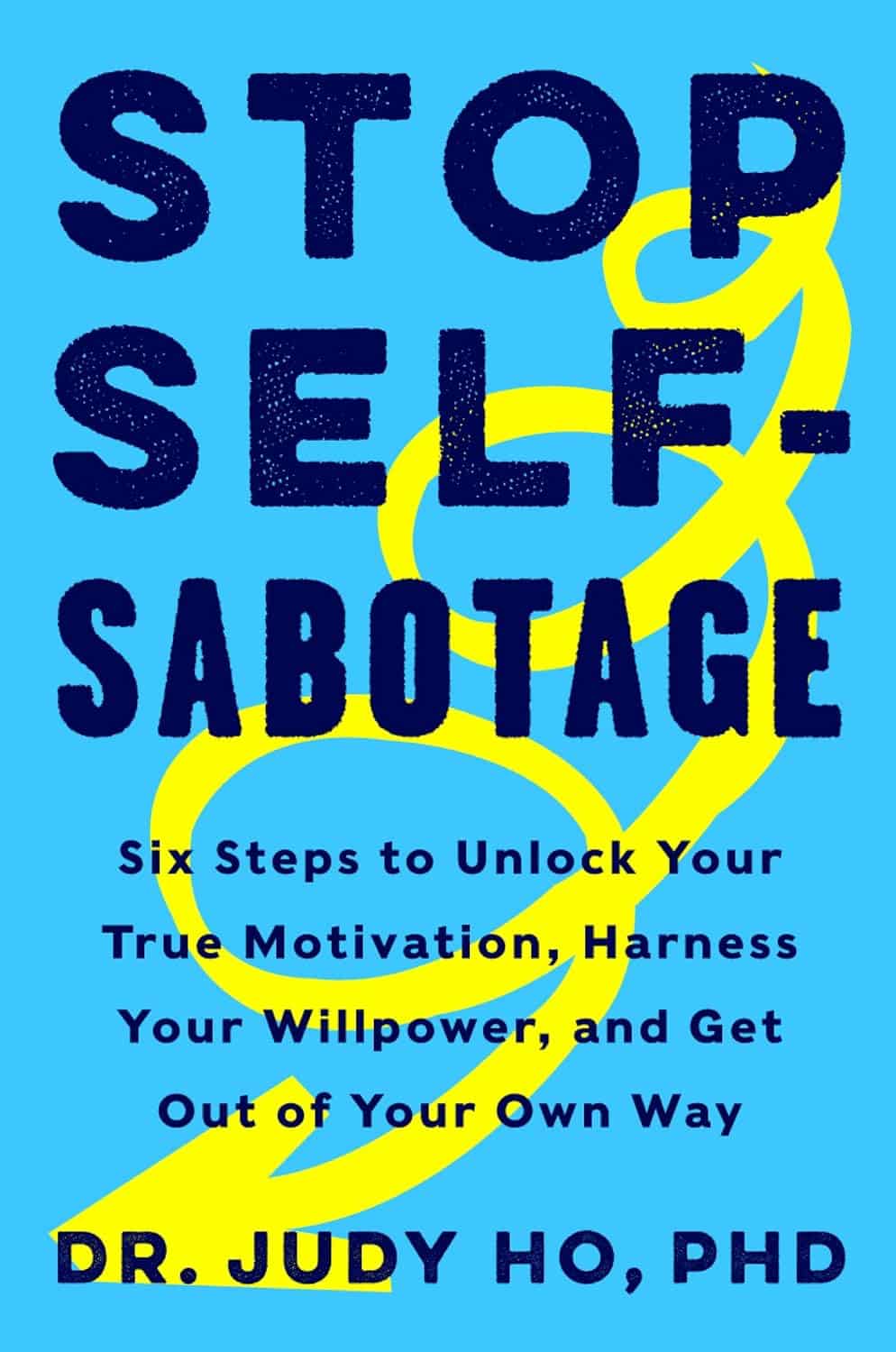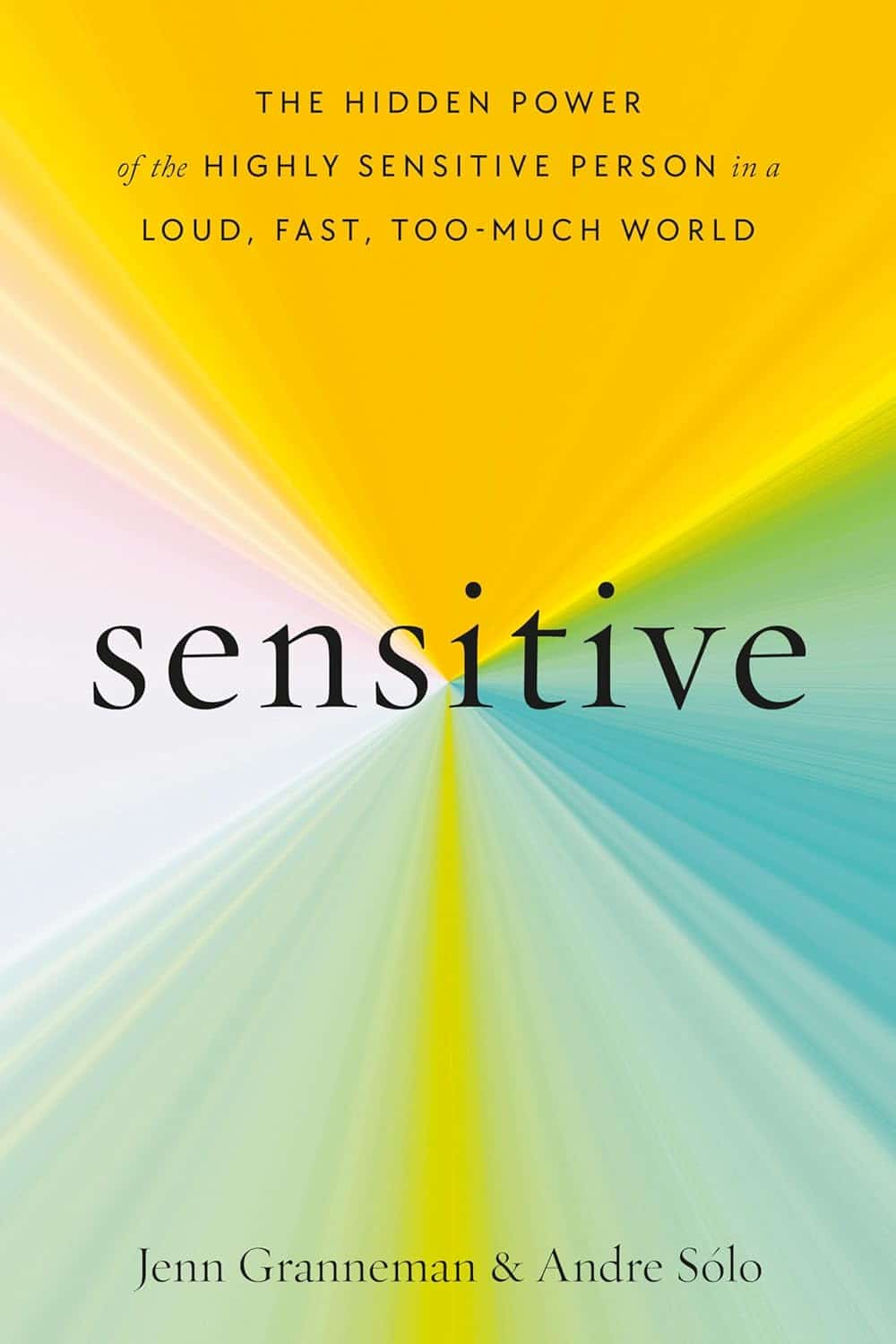
Stop Self-Sabotage – by Dr. Judy Ho
10almonds is reader-supported. We may, at no cost to you, receive a portion of sales if you purchase a product through a link in this article.
A lot of books of this genre identify one particular kind of self-sabotage, for example, they might pick one out of:
- Bad habits
- Limiting self-beliefs
- Poor goal-setting
- Procrastination
…etc, slap a quick fix on whatever they chose to focus on, and call it a day. Not so with Dr. Ho!
Here we have a much more comprehensive approach to tackling the problem of unintentional self-sabotage. With a multi-vector method, of which all angles can be improved simultaneously, it becomes much less like “whack-a-mole”… And much more like everything actually getting into order and staying that way.
The main approach here is CBT, but far beyond what most pop-psychology CBT books go for, with more techniques and resources.
On which note…
There are many great exercises that Dr. Ho recommends we do while reading… So you might want to get a nice notebook alongside this book if you don’t already have one! And what is more inspiring of optimism than a new notebook?
Bottom line: this is a great, well-organized guide to pruning the “why am I still doing this to myself?” aspects out of your life for a much more intentional, purposeful, effective way of living.
Click here to check it out on Amazon today, and stop sabotaging yourself!
Don’t Forget…
Did you arrive here from our newsletter? Don’t forget to return to the email to continue learning!
Recommended
Learn to Age Gracefully
Join the 98k+ American women taking control of their health & aging with our 100% free (and fun!) daily emails:
-
What Does “Balance Your Hormones” Even Mean?
10almonds is reader-supported. We may, at no cost to you, receive a portion of sales if you purchase a product through a link in this article.
Hormonal Health: Is It Really A Balancing Act?
Have you ever wondered what “balancing your hormones” actually means?
The popular view is that men’s hormones look like this:
Testosterone (less) ⟷ Testosterone (more)
…And that women’s hormones look more like this:
♀︎ Estrogen ↭ Progesterone ⤵︎
⇣⤷ FSH ⤦ ↴ ☾ ⤹⤷ Luteinizing Hormone ⤦
DHEA ↪︎ Gonadotrophin ⤾
↪︎ Testosterone? ⥅⛢
Clear as mud, right?
But, don’t worry, Supplements McHerbal Inc will sell you something guaranteed to balance your hormones!
How can a supplement (or dietary adjustment) “balance” all that hotly dynamic chaos, and make everything “balanced”?
The truth is, “balanced” in such a nebulous term, and this is why you will not hear endocrinologists using it. It’s used in advertising to mean “in good order”, and “not causing problems”, and “healthy”.
In reality, our hormone levels depend on everything from our diet to our age to our anatomy to our mood to the time of the day to the phase of the moon.
Not that the moon has an influence on our physiology at all—that’s a myth—but you know, 28 day cycle and all. And, yes, half the hormones affect the levels of the others, either directly or indirectly.
Trying to “balance” them would be quite a game of whack-a-mole, and not something that a “cure-all” single “hormone-balancing” supplement could do.
So why aren’t we running this piece on Friday, for our “mythbusting” section? Well, we could have, but the more useful information is yet to come and will take up more of today’s newsletter than the myth-busting!
What, then, can we do to untangle the confusion of these hormones?
Well first, let’s understand what they do, in the most simple terms possible:
- Estrogen—the most general feminizing hormone from puberty onwards, busiest in the beginning of the menstrual cycle, and starts getting things ready for ovulation.
- Progesterone—secondary feminizing hormone, fluffs the pillows for the oncoming fertilized egg to be implanted, increases sex drive, and adjusts metabolism accordingly. Busiest in the second half of the menstrual cycle.
- Testosterone—is also present, contributes to sex drive, is often higher in individuals with PCOS. If menopause is untreated, testosterone will also rise, because there will be less estrogen
- (testosterone and estrogen “antagonize” each other, which is the colorfully scientific way of saying they work against each other)
- DHEA—Dehydroepiandrosterone, supports production of testosterone (and estrogen!). Sounds self-balancing, but in practice, too much DHEA can thus cause elevated testosterone levels, and thus hirsutism.
- Gonadotrophin—or more specifically human chorionic gonadotrophin, HcG, is “the pregnancy hormone“, present only during pregnancy, and has specific duties relating to such. This is what’s detected in (most) pregnancy test kits.
- FSH—follicle stimulating hormone, is critical to ovulation, and is thus essential to female fertility. On the other hand, when the ovaries stop working, FSH levels will rise in a vain attempt to encourage the ovulation that isn’t going to happen anymore.
- Luteinizing hormone—says “go” to the new egg and sends it on its merry way to go get fertilized. This is what’s detected by ovulation prediction kits.
Sooooooo…
What, for most women, most often is meant by a “hormonal imbalance” is:
- Low levels of E and/or P
- High levels of DHEA and/or T
- Low or High levels of FSH
In the case of low levels of E and/or P, the most reliable way to increase these is, drumroll please… To take E and/or P. That’s it, that’s the magic bullet.
Bonus Tip: take your E in the morning (this is when your body will normally make more and use more) take your P in the evening (it won’t make you sleepy, but it will improve your sleep quality when you do sleep)
In the case of high levels of DHEA and/or T, then that’s a bit more complex:
- Taking E will antagonize (counteract) the unwanted T.
- Taking T-blockers (such as spironolactone or bicalutamide) will do what it says on the tin, and block T from doing the jobs it’s trying to do, but the side-effects are considered sufficient to not prescribe them to most people.
- Taking spearmint or saw palmetto will lower testosterone’s effects
- Scientists aren’t sure how or why spearmint works for this
- Saw palmetto blocks testosterone’s conversion into a more potent form, DHT, and so “detoothes” it a bit. It works similarly to drugs such as finasteride, often prescribed for androgenic alopecia, called “male pattern baldness”, but it affects plenty of women too.
In the case of low levels of FSH, eating leafy greens will help.
In the case of high levels of FSH, see a doctor. HRT (Hormone Replacement Therapy) may help. If you’re not of menopausal age, it could be a sign something else is amiss, so it could be worth getting that checked out too.
What can I eat to boost my estrogen levels naturally?
A common question. The simple answer is:
- Flaxseeds and soy contain plant estrogens that the body can’t actually use as such (too incompatible). They’ve lots of high-quality nutrients though, and the polyphenols and isoflavones can help with some of the same jobs when it comes to sexual health.
- Fruit, especially peaches, apricots, blueberries, and strawberries, contain a lot of lignans and also won’t increase your E levels as such, but will support the same functions and reduce your breast cancer risk.
- Nuts, especially almonds (yay!), cashews, and pistachios, contain plant estrogens that again can’t be used as bioidentical estrogen (like you’d get from your ovaries or the pharmacy) but do support heart health.
- Leafy greens and cruciferous vegetables support a lot of bodily functions including good hormonal health generally, in ways that are beyond the scope of this article, but in short: do eat your greens!
Note: because none of these plant-estrogens or otherwise estrogenic nutrients can actually do the job of estradiol (the main form of estrogen in your body), this is why they’re still perfectly healthy for men to eat too, and—contrary to popular “soy boy” social myths—won’t have any feminizing effects whatsoever.
On the contrary, most of the same foods support good testosterone-related health in men.
The bottom line:
- Our hormones are very special, and cannot be replaced with any amount of herbs or foods.
- We can support our body’s natural hormonal functions with good diet, though.
- Our hormones naturally fluctuate, and are broadly self-correcting.
- If something gets seriously out of whack, you need an endocrinologist, not a homeopath or even a dietician.
In case you missed it…
We gave a more general overview of supporting hormonal health (including some hormones that aren’t sex hormones but are really important too), back in February.
Check it out here: Healthy Hormones And How To Hack Them
Want to read more?
Anthea Levi, RD, takes much the same view:
❝For some ‘hormone-balancing’ products, the greatest risk might simply be lost dollars. Others could come at a higher cost.❞
Share This Post
-
Focusing On Health In Our Sixties
10almonds is reader-supported. We may, at no cost to you, receive a portion of sales if you purchase a product through a link in this article.
It’s Q&A Day at 10almonds!
Have a question or a request? You can always hit “reply” to any of our emails, or use the feedback widget at the bottom!
In cases where we’ve already covered something, we might link to what we wrote before, but will always be happy to revisit any of our topics again in the future too—there’s always more to say!
As ever: if the question/request can be answered briefly, we’ll do it here in our Q&A Thursday edition. If not, we’ll make a main feature of it shortly afterwards!
So, no question/request too big or small
❝What happens when you age in your sixties?❞
The good news is, a lot of that depends on you!
But, speaking on averages:
While it’s common for people to describe being over 50 as being “over the hill”, halfway to a hundred, and many greetings cards and such reflect this… Biologically speaking, our 60s are more relevant as being halfway to our likely optimal lifespan of 120. Humans love round numbers, but nature doesn’t care for such.
- In our 60s, we’re now usually the “wrong” side of the menopausal metabolic slump (usually starting at 45–55 and taking 5–10 years), or the corresponding “andropause” where testosterone levels drop (usually starting at 45 and a slow decline for 10–15 years).
- In our 60s, women will now be at a higher risk of osteoporosis, due to the above. The risk is not nearly so severe for men.
- In our 60s, if we’re ever going to get cancer, this is the most likely decade for us to find out.
- In our 60s, approximately half of us will suffer some form of hearing loss
- In our 60s, our body has all but stopped making new T-cells, which means our immune defenses drop (this is why many vaccines/boosters are offered to over-60s, but not to younger people)
While at first glance this does not seem a cheery outlook, knowledge is power.
- We can take HRT to avoid the health impact of the menopause/andropause
- We can take extra care to look after our bone health and avoid osteoporosis
- We can make sure we get the appropriate cancer screenings when we should
- We can take hearing tests, and if appropriate find the right hearing aids for us
- We can also learn to lip-read (this writer relies heavily on lip-reading!)
- We can take advantage of those extra vaccinations/boosters
- We can take extra care to boost immune health, too
Your body has no idea how many times you’ve flown around the sun and nor does it care. What actually makes a difference to it, is how it has been treated.
See also: Milestone Medical Tests You Should Take in Your 60s, 70s, and Beyond
Share This Post
-
Is Fast Food Really All That Bad?
10almonds is reader-supported. We may, at no cost to you, receive a portion of sales if you purchase a product through a link in this article.
Yes, yes it is. However, most people misunderstand the nature of its badness, which is what causes problems. The biggest problem is not the acute effects of one afternoon’s burger and fries; the biggest problem is the gradual slide into regularly eating junk food, and the long-term effects of that habit as our body changes to accommodate it (of which, people tend to focus on subcutaneous fat gain as it’s usually the most visible, but that’s really the least of our problems).
Cumulative effects
There are, of course, immediate negative effects too, and they’re not without cause for concern. Because of the composition of most junk food, it will almost by definition result in immediate blood sugar spikes, rising insulin levels, and a feeling of fatigue not long afterwards.
- Within a week of regularly consuming junk food, gut bacteria will change, resulting in moderate cravings, as well as a tendency towards depression and anxiety. Mood swings are likely, as are the gastrointestinal woes associated with any gut microbiota change.
- Within two weeks, those effects will be greater, the cravings will increase, energy levels will plummet, and likely skin issues may start to show up (our skin mostly works on a 3-week replacement cycle; some things can show up in the skin more quickly or slowly than that, though).
- Within three weeks, the rest of our blood metrics (e.g. beyond blood sugar imbalances) will start to stray from safe zones. Increased LDL, decreased HDL, and the beginnings of higher cardiovascular disease risk and diabetes risk.
- Within a month, we will likely see the onset of non-alcoholic fatty liver disease, and chronic inflammation sets in, raising the risk of a lot of other diseases, especially immune disorders and cancer.
If that seems drastic, along the lines of “eat junk food for a month and get cancer”, well, it’s an elevated risk, not a scheduled diagnosis, but the body is constantly rebuilding itself, for better or for worse, and if we sabotage its efforts by consuming a poor diet, then it will be for worse.
The good news is: this works both ways, and we can get our body back on track in fairly short order too, by enjoying a healthier diet; our body will be thrilled to start repairing itself. And of course, all these effects, good and bad, are proportional to how well or badly we eat. There’s a difference between doing a “Supersize Me” month-long 100% junk food diet, and “merely” getting a junk food breakfast each day and eating healthily later.
In short, if your diet is only moderately bad, then you will only be moderately unwell.
For more on all of this, enjoy:
Click Here If The Embedded Video Doesn’t Load Automatically!
Want to learn more?
You might also like to read:
- Fix Chronic Fatigue & Regain Your Energy, By Science
- How To Unfatty A Fatty Liver
- How to Prevent (or Reduce) Inflammation
Take care!
Share This Post
Related Posts
-
Sensitive – by Jenn Granneman and Andre Sólo
10almonds is reader-supported. We may, at no cost to you, receive a portion of sales if you purchase a product through a link in this article.
This book is written for what is called the “Highly Sensitive Person”, which makes it sound like a very rare snowflake condition, when in fact the diagnostic criteria (discussed early in the book) yield a population bell curve of 30:40:30, whereupon 30% are in the band of “high sensitivity”, 40% “normal sensitivity” and the remainder “low sensitivity”. You may note that “high” and “low” together outnumber “normal”, but statistics is like that.
So, if you’re one of the approximately one in three people who fall into the higher category, and/or you have a loved one who is in that category, then this book looks at the many advantages to a commonly stigmatized and (by cruel irony) criticized personality trait.
Those advantages range from personal life to work and even public life (yes, really), and can be grown, positively highlighted, used, and enjoyed.
In the category of criticism, the book does not usefully cover the benefit of psychological resilience. Resilience does not mean losing sensitivity, just, being able to also dry one’s tears and weather life’s slings and arrows when the world is harsher than one might like. But for the authors, they have stacked all their chips on “we must make the world a better place”. Which is a noble goal, if not always an immediately attainable one.
Bottom line: if you are more sensitive than average and would like to use that to benefit yourself and those around you, then this is the book for you!
Click here to check out Sensitive, and make the most of your strengths!
Don’t Forget…
Did you arrive here from our newsletter? Don’t forget to return to the email to continue learning!
Learn to Age Gracefully
Join the 98k+ American women taking control of their health & aging with our 100% free (and fun!) daily emails:
-
Treat Your Own Back – by Robin McKenzie
10almonds is reader-supported. We may, at no cost to you, receive a portion of sales if you purchase a product through a link in this article.
A quick note about the author first: he’s a physiotherapist and not a doctor, but with over 40 years of practice to his name and 33 letters after his name (CNZM OBE FCSP (Hon) FNZSP (Hon) Dip MDT Dip MT), he seems to know his stuff. And certainly, if you visit any physiotherapist, they will probably have some of his books on their own shelves.
This book is intended for the layperson, and as such, explains everything that you need to know, in order to diagnose and treat your back. To this end, he includes assorted tests to perform, a lot of details about various possible back conditions, and then exercises to fix it, i.e. fix whatever you have now learned that the problem is, in your case (if indeed you didn’t know for sure already).
Of course, not everything can be treated by exercises, and he does point to what other things may be necessary in those cases, but for the majority, a significant improvement (if not outright symptom-free status) can be enjoyed by applying the techniques described in this book.
Bottom line: for most people, this book gives you the tools required to do exactly what the title says.
Click here to check out Treat Your Own Back, and treat your own back!
PS: if your issue is not with your back, we recommend you check out his other books in the series (neck, shoulder, hip, knee, ankle) 😎
Don’t Forget…
Did you arrive here from our newsletter? Don’t forget to return to the email to continue learning!
Learn to Age Gracefully
Join the 98k+ American women taking control of their health & aging with our 100% free (and fun!) daily emails:
-
Surviving with Beans And Rice – by Eliza Whool
10almonds is reader-supported. We may, at no cost to you, receive a portion of sales if you purchase a product through a link in this article.
If you’d like to be well-set the next time a crisis shuts down supply lines, this is one of those books you’ll want to have read.
Superficially, “have in a large quantity of dried beans and rice” is good advice, but obvious. Why a book?
Whool gives a lot of advice on keeping your nutrition balanced while subsisting on the same quite few ingredients, which is handy.
More than that, she offers 100 recipes using the ingredients that will be in your long-term pantry. That’s over three months without repeating a meal! And if you don’t think rice and beans can be tasty and exciting and varied, then most of the chefs of the Global South might want to have a word about that.
Anyway, we’re not here to sell you rice and beans (we’re just enthusiastic and correct). What we are here to do is to give you a fair overview of this book.
The recipes are just-the-recipes, very simple clear instructions, one two-page spread per recipe. Most of the book is devoted to these. As a quick note, it does cover making things gluten-free if necessary, and other similar adjustments for medical reasons.
The planning-and-storage section of the book is helpful too though, especially as it covers common mistakes to avoid.
Bottom line: this is a great book, and remember what we said about doing the things now that future you will thank you for!
Get yourself a copy of Surviving with Beans And Rice from Amazon today!
Don’t Forget…
Did you arrive here from our newsletter? Don’t forget to return to the email to continue learning!
Learn to Age Gracefully
Join the 98k+ American women taking control of their health & aging with our 100% free (and fun!) daily emails:







